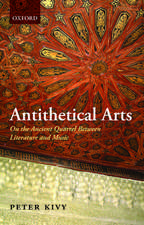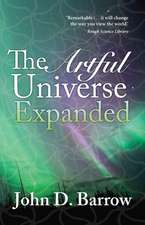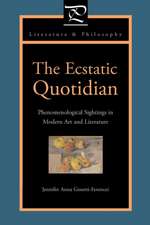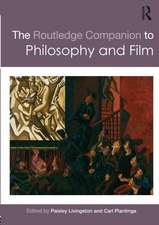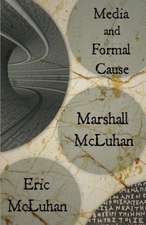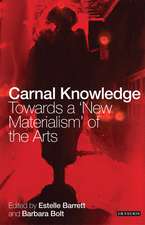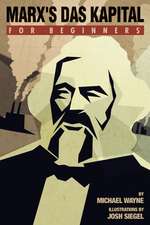Red Kant: Aesthetics, Marxism and the Third Critique
Autor Michael Wayneen Limba Engleză Hardback – 24 sep 2014
| Toate formatele și edițiile | Preț | Express |
|---|---|---|
| Paperback (1) | 256.95 lei 6-8 săpt. | |
| Bloomsbury Publishing – 23 mai 2016 | 256.95 lei 6-8 săpt. | |
| Hardback (1) | 773.65 lei 6-8 săpt. | +159.36 lei 4-10 zile |
| Bloomsbury Publishing – 24 sep 2014 | 773.65 lei 6-8 săpt. | +159.36 lei 4-10 zile |
Preț: 773.65 lei
Preț vechi: 1112.84 lei
-30% Nou
Puncte Express: 1160
Preț estimativ în valută:
148.03€ • 154.57$ • 122.24£
148.03€ • 154.57$ • 122.24£
Carte tipărită la comandă
Livrare economică 15-29 aprilie
Livrare express 08-14 martie pentru 169.35 lei
Preluare comenzi: 021 569.72.76
Specificații
ISBN-13: 9781472511348
ISBN-10: 1472511344
Pagini: 240
Dimensiuni: 156 x 234 x 14 mm
Greutate: 0.51 kg
Ediția:New.
Editura: Bloomsbury Publishing
Colecția Bloomsbury Academic
Locul publicării:London, United Kingdom
ISBN-10: 1472511344
Pagini: 240
Dimensiuni: 156 x 234 x 14 mm
Greutate: 0.51 kg
Ediția:New.
Editura: Bloomsbury Publishing
Colecția Bloomsbury Academic
Locul publicării:London, United Kingdom
Caracteristici
Discusses a wide range of major Marxist thinkers and practitioners whose readership goes beyond 'Marxists', including Adorno, Benjamin and Della Volpe
Notă biografică
Michael Wayne is Professor in Screen Media at Brunel University, UK. He is author of Marx's Das Kapital For Beginners (2012) and Marxism and Media Studies: Key Concepts and Contemporary Trends (2003).
Cuprins
Introduction1. Disinterring Kant2. Kant's First Critique and The Problem of Reification3. The Aesthetic, The Beautiful and Praxis4. The Aesthetic and Class Interests5. The Sublime in Kant's Philosophical Architecture6. Labour, The Aesthetic And Nature7. On Marxism and Metaphor8. In The Laboratory Of Kant's AestheticBibliographyIndex
Recenzii
Wayne's book makes a provocative and substantial contribution to Marxist philosophy that should help to stimulate productive new approaches to the aesthetic dimension of radical politics and the deeper ground of critique in general.
Red Kant: Aesthetics, Marxism, and the Third Critique is impressively ambitious: it aims to synthesize two notoriously difficult and revolutionary philosophers in order to reveal a causal connection between the third Critique and Marxist social theory. ... [Wayne's] writing is unpretentious, accessible, and jargon-free; he covers difficult terrain lightly and quickly; and he raises many questions that later scholars may feel compelled to answer (or, at least, to investigate).
Red Kant attempts nothing less than a reclaiming of the aesthetic for the cause of emancipatory social transformation ... [Wayne] situates his case within Kant's formidable philosophical system and draws consequential links to Marx ... Its success in this endeavour rests largely on Wayne's rare ability to distinguish philosophical explication from his own powerful reinterpretations.
Red Kant: Aesthetics, Marxism, and the Third Critique, offers a cogent and valiant defense of the necessity for sophisticated thinking about aesthetics in our contemporary moment . a valuable resource on the relationship between Kant's philosophy and Marxist critical theory. Red Kant reaffirms the radical political power of the aesthetic; and Wayne's reading of Kant goes a long way towards repairing this 'bourgeois' and 'idealist' philosopher's reputation. Such a project has been, I think, long overdue.
No longer just an archetypal bourgeois philosopher, Kant emerges from Wayne's new book as a thinker whose system led him to grasp the stultifying limits of positivist reason. Wayne provides incisive critiques not just of bourgeois presentations of Kant but also of earlier left readings of his aesthetic by Bourdieu, Deleuze, Eagleton,Rancière and others; he demonstrates the contemporaneity of the Kantian model through sparkling analyses of films, ranging from Casablanca to Land of the Dead. A compelling demonstration of the continuing resourcefulness of rational critique for progressive cultural politics today.
Michael Wayne does more than just read Kant's Critique of Judgment against the grain he manages to deliver us a truly radical Kantian agency that neither mainstream scholars nor dominant Marxist interpreters have dared to consider. Red Kant anticipates techniques of aesthetic estrangement found in Brecht, Benjamin and certain forms of science fiction. Red Kant rescues aesthetic populism for Marxist critics who have too long abandoned research into working class fantasy and imagination to anthropology, cultural studies and corporate marketers. Red Kant reassigns concepts such as beauty and the sublime to the social-historical realm, reinvigorating material production with a utopian inflection made possible by the metaphorical workings of the aesthetic. Red Kant rocks.
In this bold and original re-thinking of Kant, Michael Wayne argues that with his aesthetic turn in the Third Critique, Kant broke significantly from the problematic philosophical structure of the Critique of Pure Reason. Through his philosophy of the aesthetic Kant begins to circumnavigate the dualities in his thought. In so doing he shows us today how the aesthetic is a powerful means for imagining our way past the apparent universality of contemporary capitalism.
Wayne does more than simply make a familiar plea for the role of the aesthetic as socially transformative; he situates his case within Kant's formidable philosophical system and draws consequential links to Marx, all the while deflecting, through helpful explication, the views of his 'bourgeois' interlocutors.
Red Kant: Aesthetics, Marxism, and the Third Critique is impressively ambitious: it aims to synthesize two notoriously difficult and revolutionary philosophers in order to reveal a causal connection between the third Critique and Marxist social theory. ... [Wayne's] writing is unpretentious, accessible, and jargon-free; he covers difficult terrain lightly and quickly; and he raises many questions that later scholars may feel compelled to answer (or, at least, to investigate).
Red Kant attempts nothing less than a reclaiming of the aesthetic for the cause of emancipatory social transformation ... [Wayne] situates his case within Kant's formidable philosophical system and draws consequential links to Marx ... Its success in this endeavour rests largely on Wayne's rare ability to distinguish philosophical explication from his own powerful reinterpretations.
Red Kant: Aesthetics, Marxism, and the Third Critique, offers a cogent and valiant defense of the necessity for sophisticated thinking about aesthetics in our contemporary moment . a valuable resource on the relationship between Kant's philosophy and Marxist critical theory. Red Kant reaffirms the radical political power of the aesthetic; and Wayne's reading of Kant goes a long way towards repairing this 'bourgeois' and 'idealist' philosopher's reputation. Such a project has been, I think, long overdue.
No longer just an archetypal bourgeois philosopher, Kant emerges from Wayne's new book as a thinker whose system led him to grasp the stultifying limits of positivist reason. Wayne provides incisive critiques not just of bourgeois presentations of Kant but also of earlier left readings of his aesthetic by Bourdieu, Deleuze, Eagleton,Rancière and others; he demonstrates the contemporaneity of the Kantian model through sparkling analyses of films, ranging from Casablanca to Land of the Dead. A compelling demonstration of the continuing resourcefulness of rational critique for progressive cultural politics today.
Michael Wayne does more than just read Kant's Critique of Judgment against the grain he manages to deliver us a truly radical Kantian agency that neither mainstream scholars nor dominant Marxist interpreters have dared to consider. Red Kant anticipates techniques of aesthetic estrangement found in Brecht, Benjamin and certain forms of science fiction. Red Kant rescues aesthetic populism for Marxist critics who have too long abandoned research into working class fantasy and imagination to anthropology, cultural studies and corporate marketers. Red Kant reassigns concepts such as beauty and the sublime to the social-historical realm, reinvigorating material production with a utopian inflection made possible by the metaphorical workings of the aesthetic. Red Kant rocks.
In this bold and original re-thinking of Kant, Michael Wayne argues that with his aesthetic turn in the Third Critique, Kant broke significantly from the problematic philosophical structure of the Critique of Pure Reason. Through his philosophy of the aesthetic Kant begins to circumnavigate the dualities in his thought. In so doing he shows us today how the aesthetic is a powerful means for imagining our way past the apparent universality of contemporary capitalism.
Wayne does more than simply make a familiar plea for the role of the aesthetic as socially transformative; he situates his case within Kant's formidable philosophical system and draws consequential links to Marx, all the while deflecting, through helpful explication, the views of his 'bourgeois' interlocutors.
Descriere
Descriere de la o altă ediție sau format:
In this bold and original re-thinking of Kant, Michael Wayne argues that with his aesthetic turn in the Third Critique, Kant broke significantly from the problematic philosophical structure of the Critique of Pure Reason. Through his philosophy of the aesthetic Kant begins to circumnavigate the dualities in his thought. In so doing he shows us today how the aesthetic is a powerful means for imagining our way past the apparent universality of contemporary capitalism.
In this bold and original re-thinking of Kant, Michael Wayne argues that with his aesthetic turn in the Third Critique, Kant broke significantly from the problematic philosophical structure of the Critique of Pure Reason. Through his philosophy of the aesthetic Kant begins to circumnavigate the dualities in his thought. In so doing he shows us today how the aesthetic is a powerful means for imagining our way past the apparent universality of contemporary capitalism.









